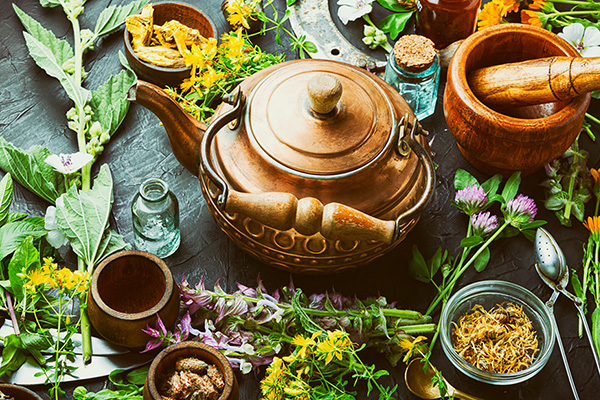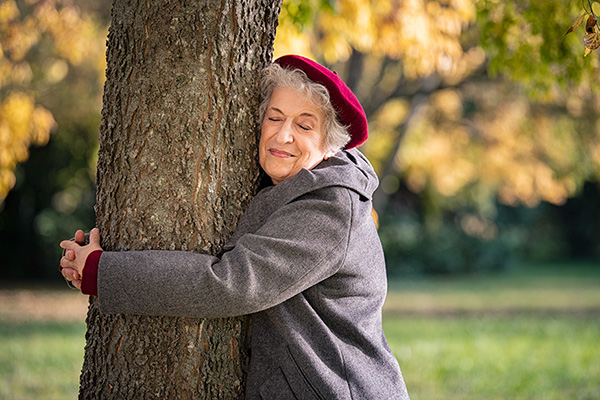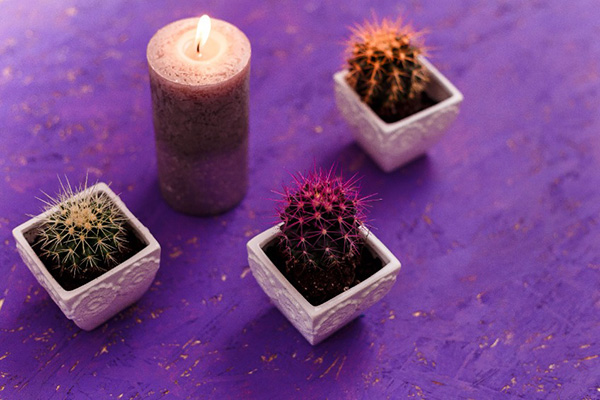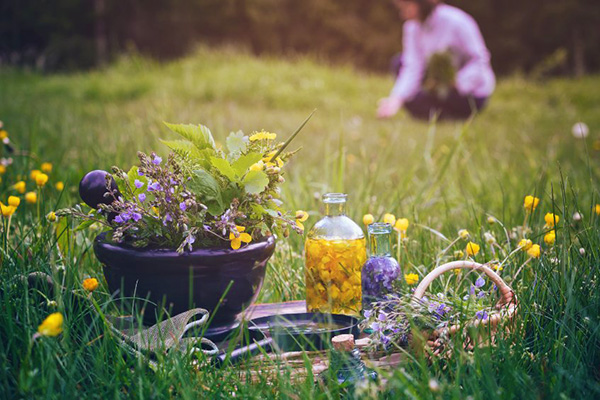natural remedies
Developing Your Herbal Intuition
 Herbal medicine is becoming increasingly popular, and many people are increasingly turning to herbalism as a healthcare supplement, or even a substitute to conventional pharmaceutical medicine. Plants, flowers, and herbs all have unique energetic qualities that make them suitable for various purposes. They are alive and respond to their environment and how they are treated in the same way humans do.
Herbal medicine is becoming increasingly popular, and many people are increasingly turning to herbalism as a healthcare supplement, or even a substitute to conventional pharmaceutical medicine. Plants, flowers, and herbs all have unique energetic qualities that make them suitable for various purposes. They are alive and respond to their environment and how they are treated in the same way humans do.
When we think of herbs, we tend to narrowly categorize them according to the medical conditions they can be used for, or what aspect of our health and wellness they can improve. However, like people, herbs are much more complex and multi-faceted, and have many uses and applications, alone or in combination with other herbs.
To obtain the most benefit from any herb, we need to take the time and have patience to truly get to know the herb. When you meet someone for the first time at a social event, would you diminish the other person’s true worth by instantly deciding they have only one useful trait or redeeming quality, and leave it at that? Taking the time to get acquainted with a particular herb is much like getting to know someone in an intimate friendship.
Selecting herbs to work with or draw upon for healing is a highly intuitive process. The appearance, aroma, taste, texture, and energy vibration of the ideal herb for a specific purpose must speak to us mind, body, and soul. They convey a distinct energy signature and frequency of healing that the intuitively aware user will innately know is best to use at that time.
The Healing Power Of Tree Hugging
 Trees and plants are the most powerful energy conduits on the planet, next to the various bodies of water, such as the ocean, lakes, rivers, ponds, and so on.
Trees and plants are the most powerful energy conduits on the planet, next to the various bodies of water, such as the ocean, lakes, rivers, ponds, and so on.
It is no coincidence that many of the powerful energy vortex locations on the planet are typically surrounded by forests and abundant vegetation, such as Stonehenge in Wiltshire, England; Es Vedrà on the Spanish island of Ibiza; Mount Shasta in Siskiyou County, California; Machu Picchu in southern Peru; and the Mayan ruins in Tulum, Mexico. All these spiritual power spots feature either natural or man-made rock formations with a unique structure or design that draws energy from the surrounding vegetation, especially the trees.
Did you know that without trees humanity would not survive? Without trees to filter and replenish our air with oxygen, we would not be able to breathe without wearing gas masks. Trees are a vital link in the carbon cycle – a process in which carbon dioxide is constantly circulating through the atmosphere into organisms and back again.
Carbon is the second most valuable element to life, after water. Trees absorb carbon from the atmosphere and turns it into energy. The carbon is then either transformed into oxygen and released into the air we breathe, or stored inside the tree until it decomposes into the earth.
Without trees we will also starve, as there will no longer be nutrient-rich soil for us to grow food, and there will be chronic droughts. Planet Earth will in time become an arid wasteland. There will be no food to eat and very little fresh water to drink. Trees are essential to the energy of life.
The Metaphysical Properties Of Houseplants
 Many people who use houseplants to brighten their living space do not realize that they also have metaphysical properties to enhance our spiritual and energetic well-being. Plants, in addition to beautifying our environment, have mystical qualities, and also serve to purify and detoxify the air we breathe.
Many people who use houseplants to brighten their living space do not realize that they also have metaphysical properties to enhance our spiritual and energetic well-being. Plants, in addition to beautifying our environment, have mystical qualities, and also serve to purify and detoxify the air we breathe.
Herbs are especially powerful and traditionally associated with mental clarity, serenity, and purification. An ancient spiritual cleansing tradition is smudging in which the smoke of burning dry sage and other herbs is used to purify spaces and banish negative energies.
Many herbs are also edible and can be made into elixirs, teas, or potpourri mixes. Delicious and nourishing herbal teas are the perfect way to begin or end a day. Herbs can also be added to healing baths and to enhance nutritious food. Some of my favorites are lavender, mint, rosemary, and basil.
Herbs are easy to grow and do not take up much space. They are no doubt the most versatile houseplant, and even a small apartment can host a herb garden if it has a sunny windowsill.
If you’ve never owned houseplants before, begin with a succulent, such as a cactus or aloe plant. They don’t require much maintenance or watering. Many succulents have spines or spikes, which is why they are associated with protective energies and healing. They are the ‘armor wearers’ of the plant kingdom and keep feelings of despair, gloom, and anxiety at bay. Aloe is also well-known as a treatment for minor cuts, itches, and burns, so grab a piece if you have a slight accident at home and rub some on.
Energy Work With Lunar Herbs
 The Moon is traditionally associated in healing and metaphysical practices with several flowers and plants, specifically herbs. Many of these herbs are silver, grey, or pale blue, as well as green, much like the Full Moon itself. Many of these plants are also associated with water, or grow near it.
The Moon is traditionally associated in healing and metaphysical practices with several flowers and plants, specifically herbs. Many of these herbs are silver, grey, or pale blue, as well as green, much like the Full Moon itself. Many of these plants are also associated with water, or grow near it.
There are several ways to use herbs in your practice, such as ingesting it in teas or other edible formats, and burning it as incense to purifying ourselves and our living spaces.
During the peak of the moon cycle when it is at its strongest during the Full Moon, is a powerful time to reflect on our emotions, the subconscious, healing, and parts of the body associated with water (blood, digestive system, reproductive system). We can enhance this powerful lunar energy by drinking an appropriate herbal tea, or burning an incense blend consisting of lunar herbs.
Different herbs are associated with the different energies of the lunar cycle. If you are working through some difficult emotional baggage, try lavender, wild rose, lotus, poppy, or kava-kava.
Since the Moon encourages healthy consumption of water and moisturizing, herbs like aloe vera, coconut, chickweed, or marshmallow and aniseed roots act as both natural refreshers and soothers. They are excellent to ensure healthy water absorption, and gels made from aloe are well-known as natural moisturizers.
If you wish to deepen your levels of compassion and understanding during a moon cycle, try mugwort, wormwood, or passionflower. Many of these herbs are edible and delicious. Just be sure to double check first, before adding them to your salad or your teapot!
Healing With Herbs
 The past two years I have turned increasingly to herbs for natural healing. A good friend told me about herbs and how they help her family and I begin to do research. Soon I started taking herbs and have had excellent results.
The past two years I have turned increasingly to herbs for natural healing. A good friend told me about herbs and how they help her family and I begin to do research. Soon I started taking herbs and have had excellent results.
Herbal medicine has gone from alternative to mainstream. The proper use of many common herbs (some of which can be easily grown at home) can help keep you healthy. Try herbal infusions in teas, lotions and soaps to see what works best for you.
You may not know the many uses for these common herbs and plant extracts, so I have compiled a list of those I often use in my personal life:
Ginger – known as the ‘universal medicine’ in Ayurvedic tradition for its many uses, including anti-nausea and motion sickness, digestive aid, and circulatory aid. It can be consumed in powder or fresh form.
Basil – has a spicy scent which can be used to revive faintness. It is also useful for an overactive thyroid, improving one’s concentration, and as an antioxidant packed with Vitamins A and C.
Curry – like ginger it is a popular herb in Ayurvedic medicine. Some of its uses include pain relief, ‘brain power’ to help ward off Alzheimer’s disease, and antioxidant. It also has been shown to improve skin tone.
Peppermint – thought to be the world’s oldest herbal remedy. It is used to combat nausea and vomiting, increase mental stimulation, and boost energy levels. It can also be used as a mild analgesic.
Parsley – in addition to being a popular food garnish it helps prevent gall bladder infections and kidney stones. It’s also loaded with antioxidant and deodorizing properties.
Spiritual Awakening And The Segmented Sleep Cycle
 One of the most commonly experienced symptoms of spiritual awakening is frequently waking in the early hours from 3am to 5am. It’s important to rule out any medical reasons this could be happening. However, if you are in good health and you have been regularly waking up this early, then you may be experiencing this due to spiritual awakening.
One of the most commonly experienced symptoms of spiritual awakening is frequently waking in the early hours from 3am to 5am. It’s important to rule out any medical reasons this could be happening. However, if you are in good health and you have been regularly waking up this early, then you may be experiencing this due to spiritual awakening.
You may have found by now in an online search that you are waking up at 3am because it is ‘the witching hour’. You may also have read that 3am is an auspicious time to wake, or the opposite, that it is a ‘time of dark magic.’ Or that during your spiritual awakening you may be ‘spiritually attacked’ and this is why you are waking in the wee hours. While some of this may be true for some people, I am going to have to say that it probably has nothing to do with your waking up at or around 3am.
Yes, it is a sign of awakening! And a very, very common one too. But the reason you are waking at 3am is not metaphysical; it is biological. It is biology which is influenced by your spiritual progression. But essentially it is a return to your natural state of being – your natural sleep cycle. This is called the circadian rhythm.
Most people just accept that we sleep naturally for about eight hours a night. But there is a great deal of evidence that this is not actually the natural sleep cycle for human beings. In fact, evidence suggests that prior to the industrial revolution, our sleep cycle was very different.
To demonstrate this point, we must return to the concept of awakening and what awakening really is. We call it spiritual ‘awakening’ for a reason – we are waking up. Waking up means being conscious in an otherwise largely unconscious world. During the process of awakening people often find themselves becoming very sensitive to things that never really bothered them before. This is because they are suddenly present and hyper-aware when things are out of alignment with the natural order.
The Wisdom Of Intuitive Eating
 I remember reading an article many years ago about a research study conducted with children suffering from various nutritional deficiencies and food allergies. The scientists invited about 20 of these kids into a room with a table on which there was a variety of foods on display. They allowed each child to help themselves to any of the food they preferred. The outcome was astounding!
I remember reading an article many years ago about a research study conducted with children suffering from various nutritional deficiencies and food allergies. The scientists invited about 20 of these kids into a room with a table on which there was a variety of foods on display. They allowed each child to help themselves to any of the food they preferred. The outcome was astounding!
Each child chose a selection of food that their body naturally would tolerate the best. In other words, they instinctively chose foods that would not a bad for them or cause an allergic reaction. Furthermore, the children also chose more foods containing the nutrients their little bodies were lacking.
This confirmed for me the fact that our intuition or inner guidance system is not merely something we rely on when we are facing major life challenges, or when we are engaging in some form of spiritual practice. Intuition guides us every day in everything we do.
Intuitive eating is very much about honoring the temple which houses our soul. I believe we could potentially become nutritionally much healthier if we learn to trust our intuition more when we make dietary choices, instead of following fad diets and food trends.
Intuitive eating is about challenging modern society’s ‘food police,’ as well as the negative self-talk about eating and food choices many of us tend to engage in.
Intuitive eaters soon find that they eat just the right amount of various foods to nourish and satisfy their body, as they learn to truly recognize their body’s signals. Once you can do this, you are on your way to building a healthy relationship with food.
Be gentle with yourself. Avoid those magazines and influencer images on social media that prompts you to put pressure on yourself to look a certain way. Don’t give energy to such things. Instead, listen to your own body. You are uniquely you, and so is your body. When you express self-love within, you will also express it outwardly. Self-love ‘turns head’s like no designer outfit can!